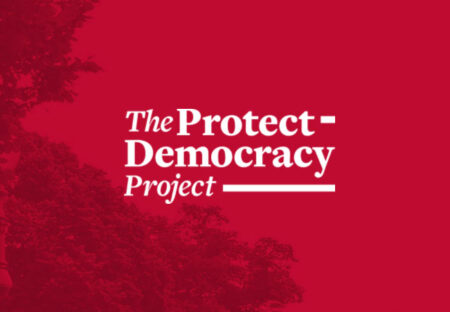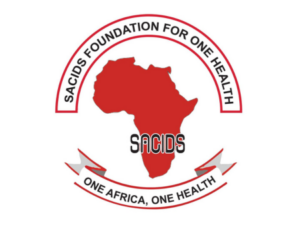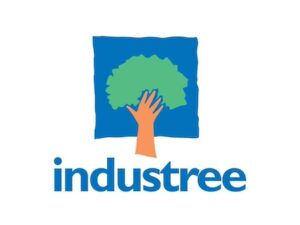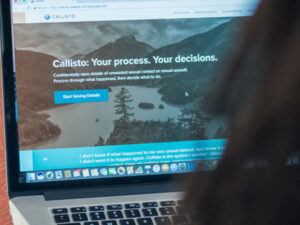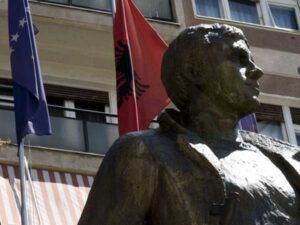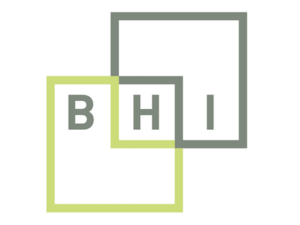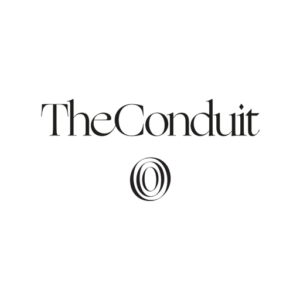The Protect Democracy Project works to prevent authoritarianism in the United States including by protecting free and fair elections and strengthening institutions.
Justin Florence of the Protect Democracy Project spoke with Skyler Reid on March 27, 2023. Click here to read the full conversation with insights highlighted.
Skyler Reid: Would you mind introducing yourself and talk a little about what issue Protect Democracy is addressing and how are you addressing it?
Justin Florence: I am Justin Florence. I am one of the co-founders of Protect Democracy, and happy to be talking to you.
Our mission is to protect US democracy from declining into a more authoritarian form of government. So our name really captures our mission. To unpack that a little bit, I think for a long time in the late 20th century, even in the beginning of the 21st century, there was a sense that democracy was on the rise around the world, and that liberal democracy had prevailed. Over the last stretch, that conventional wisdom has been turned on its head. Across the globe in different countries, there has been, rather than yet another wave of democracies on the rise, democratic backsliding.
Once stable democracies declined into more authoritarian forms of government. We’ve seen that in places like Hungary and Poland and Turkey and Venezuela. The United States is not immune to that. Over the last few years, we’ve seen real democratic backsliding here. And our mission is in many ways a very conservative one, to protect and defend the democracy that I grew up in and hope my kids someday will grow up in. Recognizing that it’s never been perfect, that there have always been flaws, that we have to make it better and more inclusive and more resilient too, but that fundamentally we want to protect it.
Skyler Reid: I’m curious then, how is that accomplished? What do you do?
Justin Florence: I’ll give an overview of how we’ve approached our mission and then we can talk more about some specifics as we go from there. One thing we’ve done is to conceptualize our mission and strategy in some different components. We often call them phases, although in many ways, they happen at the same time, so they’re not sequential. [There are] three in particular. One is how do we stop the worst things from happening right now this year and over the next 18 month, two year window? When we had an autocrat in the White House, how do we stop that autocrat from using all of the levers of government to keep himself in office or put himself above the law?
In the last few years, the core focus of that area of work has been on elections and how we make sure the next election is a free and fair election where votes are counted, where the winner takes office and it is not a successful coup where people who don’t actually win somehow put themselves in power. That’s the first phase, kind of keeping the roof from collapsing.
The second phase is that our democracy relies on different institutions and different guardrails to function well, and we’ve seen how some of those have been weakened and we need stronger and better ones. So how can we strengthen the themes of the ceiling, the walls of the house, in a way that our democracy is more resilient against a future autocrat? That it is a lot harder the next time somebody’s in the White House who wants to govern above the law to do so.
The third phase, or the third pillar, is to zoom out and look at the bigger picture of what got us into this mess. What are the ways in which our democracy hasn’t been working as well as it could and has left an opening for a strongman faction and an authoritarian movement? How can we address some of those underlying features that got us into this in a way that reverses the tide against the authoritarian movement? And also to that point, as I mentioned before, if you look over the course of American history, there have been highs and lows, but there have been a lot of ways that our democracy has become more inclusive and more equal and more representative. How can we, in a meaningful way, continue on that trajectory?
So to your question, we’ve got those three different phases. We also have a general approach or orientation, which is we want democracy to be something that the American people together can believe in, whatever their views on different policy issues or different values are. It’s something that’s united a lot of the country before and should be a nonpartisan issue and one that has crossed ideologies. We have very intentionally built a team that has libertarians and independents and conservatives and progressives and folks who have worked for Republicans and for Democrats, in a way that can come together around some basic democratic values and principles that can bring together a big cross section of the population, we hope. That cross ideological orientation is really important.
The final thing I’ll say in terms of overview is we’re a mission focused organization. We have this very audacious mission and we want to use whatever tools we can to advance that. Sometimes we use litigation, sometimes we use policy development, sometimes we use coalition advocacy or technology or strategic communications or research, and we’ll try to bundle together different tools to be able to do the things we want to do. To really focus on how to achieve this mission as opposed to we have this tool, how can we use this tool over and over again?
Skyler Reid: Do you have any examples of the tools you use to go about doing that?
Justin Florence: Yeah, I’ll give you a couple. The first is maybe the one that folks find most surprising for an organization started by a couple of lawyers who have worked in government. We have a technology shop and they built a program called VoteShield, which comes out of the recognition that state voter registration databases are extremely vulnerable to attack or manipulation, whether from a malicious foreign actor or just from routine error in ways that could make it difficult or impossible for lots of people to vote. Not one or two folks, but tens of thousands of people in a jurisdiction.
We built a software tool that helps election administrators track changes in voter registration records in order to ensure that those changes aren’t malicious. Over the last couple years, we’ve helped protect 155 million voter records through the software and done that working with 24 different states, states with Democrats and Republicans and purple states and supporting the election officials who are on the front lines to help identify when things are going off the rails and put fixes in place. That is one example of the type of thing where you hope that it all goes smoothly and it’s an insurance policy that you’ll never need to use, and this tool can help us all and help strengthen the institutions.
So that was technology. I’ll give a different example of some litigation work we’ve done. I think folks know, one of the bigger challenges our democracy faces these days is about disinformation, and that can be dangerous and destructive in all kinds of contexts, but one where it’s really potentially problematic is around elections. Folks spreading little lies or big lies about what the outcome of the election is or whether there’s voter fraud or whether folks can trust our election process.
Our team had a realization that there are some well established legal tools that can be used to deter and protect against disinformation in this context, and in particular, defamation litigation is being underutilized. The way the legal landscape works, sometimes if you’ve got a case like the Dominion case against Fox News, there’s so much money at stake that lots of lawyers are out there to bring a case like that.
But in other times, you might have one or two election workers or a civil servant or a volunteer who is the subject of really cruel and malicious defamation that spreads lies about our voting process. There’s not a lot of money necessarily at stake for them, but their reputation is at stake and they suffer real concrete harm. We built a program to provide pro bono representation to election officials and volunteers and individuals who have been victims, to help them get justice and to create accountability for those who are sort of serial and malicious spreaders of disinformation against those folks. We have a handful of different pieces of litigation around the country on that topic. So that’s a couple different examples that are focused on the here and now, on threats we’re facing.
Skyler Reid: This is a big issue and there’s a lot of people also looking at it right now. Is there anything specifically that makes the way Protect Democracy is working distinct?
Justin Florence: Three things. One is I think we were the first organization with the mission frame that I described that’s uniquely focused on the authoritarian threat to our democracy. There’s a lot of excellent organizations doing work to strengthen our democracy in different ways and focused on voting rights and government ethics and campaign finance and gerrymandering and corruption. But the lens we’ve had is not just a question of how we can bring some more sunshine or more transparency or figure out some corruption, but this thing that most folks have taken for granted is at stake and we’ve got to recognize the seriousness of that threat. That mission lens has been really valuable to us in providing clarity of focus, and I think we’ve been effective at helping raise concern and help a broader set of organizations and leaders focus on that issue.
The second is the cross ideological approach I mentioned, which is hard. In our political world, advocacy groups are so neatly divided into groups on the left and groups on the right. There’s also a handful that are like, “We’re in the center, we’re bipartisan.” There is a real risk that if you try to be cross ideological, you can become wishy-washy and in the middle for the sake of being in the middle and therefore, not actually espousing any beliefs. I think we’ve been effective at being truly cross ideological and not approaching things from a partisan perspective, but also being principled and taking things seriously and being action oriented, doing things and not just being in the middle.
The third thing I’ll mention is the approach we’ve taken to our advocacy has tried to really focus on integrated advocacy. I talked before about, here’s a technology program and here’s a set of litigation, and those kind of broke out into different tools. But most of our work is multiple tools working together. So to take those two examples, VoteShield, it’s a technology program, but it also involves lawyers who understand different laws in different states about names of standard voter registration databases. It’s policy experts and advocates who are engaging with different state election officials. It’s communication specialists who are working with the media to help them understand and convey to their audience how these things work.
On defamation litigation, just today we put out a research paper on the actual malice standard, the legal standard under the First Amendment that works in these cases. That’s our real kind of research and thought leadership product. We have communicators working on those issues and almost anything we do, there’s lawyers and communication strategists and policy experts and coalition builders all working together in harmony, and I think that’s been a useful approach for us.
VoteShield covers and protects 155 million American voters. We’ve had multiple, four and five digit groups of folks where we’ve actually spotted concerns and worked with state officials to address them in different jurisdictions.
Skyler Reid: Are there any other specific examples of the effectiveness of your work that you could share?
Justin Florence: One thing I’ll share that we’re super proud of is the work on the Electoral Count Reform Act. For folks who are in the world of Congress and elections, this was at the center of our political debate for a few months at the end of 2022. We started working on this issue back in 2019. We convened a National Task Force on Election Crises, which was a cross ideological group of about 50 experts working together to identify and plan around the types of big crises that could come in an election. One of the things they did was a bunch of scenario planning to look at all the ways things could go off the rails, from a pandemic to aliens coming from outer space. Back in 2019, the group zeroed in on how the law that governs how Congress counts the electoral votes had a lot of vulnerabilities in it and could be the source of a lot of mischief.
We started raising concerns about that, offering guidance on how to avoid that and ultimately, we proposed reforms. After January 6th, when the whole event of January 6th was because of the former president’s effort to incite a crowd to manipulate how the electoral votes were counted, the Task Force released a detailed report that called for a set of reforms, including fairly prescriptive reforms to the Electoral Count Act. Over the year and a half or two years, we worked very closely with other experts, with legal scholars, with political leaders from across the aisle to build out a set of policy proposals and an advocacy coalition to make them happen. We also provided a lot of information and support to different members of Congress who are focused on this issue. The Executive Branch tried to instigate a lot of advocacy and get more people concerned about this, writing about it and focusing on it.
Ultimately, it is not often and not easy that the US Congress passes a law on anything, let alone on a contentious issue like how presidential elections are decided. But at the end of December 2022, the president signed the Electoral Count Reform Act, which included all of the major priorities we’d had in our blueprint. Obviously, there are a lot of people responsible for making something like that happen, from the president who signed it to the senators and representatives who worked on it and other experts. But we felt really proud of the role that we played in putting that topic out there and helping guide the debate and contribute to the legislative advocacy.
Skyler Reid: Do you have any specific lessons or insights that you’ve learned that Protect Democracy has picked up during its work that would be helpful to others?
Justin Florence: I think a lot of the lessons that I learned in the six years I’ve been at Protect Democracy, and we’re six years old, so the six years we’ve been doing this, are about how to make an organization work well.
The first of those is that organizational culture really matters, and being intentional about that from the outset makes a huge difference. When my co-founder, Ian Bassin, and another co-founder, Emily Loeb, and I first started talking about Protect Democracy in November 2016, one of the first things Ian did was send us a Google document with a set of proposed culture principles for the organization. And I will confess, at the time, I ignored that email and was like, “No, but let’s talk about all the work we’re going to do and fundraising and hiring staff.” Pretty quickly I came to realize that the culture principles were everything and that we wanted a team that really works well together and can support and sustain and push each other on a hard mission in hard times. I think more than anything, the reason our organization has been successful is that we work well together, we collaborate well and we have a set of shared language and frameworks and principles that enable us to do that. So that’s one lesson, to really prioritize the [organizational] culture.
A second is, we’ve talked a bit during the conversation about the broad coalition, and I think that really matters in a couple of ways. The broader you can build a coalition, the more different people – who often disagree on a lot of other things – can come together, the more likelihood of advocacy success in our world. In some sense, that’s kind of obvious. Beyond that, you can build coalitions well by being good team players. We’ve tried really hard not to be turfy, not to be in it so that we can have our names in the paper or our organization in the limelight and to really think, here’s where we can contribute, here’s what we can offer, let us do that, where can you contribute, what resources do you have. Really try to stay away from any kind of turfiness or like, “This is our issue. We started doing this first. What are you doing here?”
The type of problems that we work on, that I think a lot of social innovators and entrepreneurs work on across fields, they’re huge issues. They’re not the types of things that any one organization, no matter how effective any one leader, no matter how talented, is going to be able to solve. We are now an organization of almost 100. When we started, we were 10, 20. Thinking about the scale of that against the scale of the United States government or the White House or the Justice Department or a national political organization. You have to build a lot of collaborators to do things well. I’m happy to offer more, but those are a couple that come to mind.
Skyler Reid: How do you measure success? How do you know that you’re making progress?
Justin Florence: It’s one of the hardest things to do. For some of our work we can be very precise. For example, of the things that we’ve talked about so far, in our strategic plan last year we set out a set of priorities, one of which was to get Congress to pass reform to the Electoral Count Reform Act that implements the priorities we have. That is a pretty easy one. We can highlight that green in our tracker because we set up very clear goals and we can measure success. The same goes for some of the litigation or technology solutions where we might have had a court order in this case or expand our technology program to these additional states and cover more voters. When we can, we try to use those types of very verifiable goals and key results, we use the objectives and key results model.
There are other situations though, and some of the deeper situations, where that’s just really hard. Ultimately, the challenge we’ve got is that there is an organized faction and a base of support for it that is behind some more authoritarian approaches to government. We need to shrink that faction and reduce the amount of political power they hold and their ability to build that power. For that type of medium to long term set of goals, we can do some things like looking at news media coverage and to what extent are different media sources spotlighting this problem? To what extent are different civil society actors engaging? Have we been able to build a coalition with different business members or with different national security community alumni to engage seriously and work in their communities and their constituencies to raise alarm? Some of those things are a little bit more, are we building a coalition, are we growing supporters, are we getting more folks engaged on these issues, and a little less concrete than did Congress pass a bill or did a court issue a decision that we like.
Skyler Reid: Anyone involved with social innovation, with trying to make these types of big changes, will inevitably run into things that did not work. Is there anything you could describe that taught you a lesson by not working out?
Justin Florence: I’ll name two. I’ve talked about our culture, our principles before, and one of them is that panic is the enemy. Especially when we were early on, in early 2017, it was easy to succumb to the panic and hard to resist it. The news cycle we live in, everything was happening so fast and the president at the time was using the power of government in very tangible ways against Americans in different communities that we cared a lot about, that we were in.
We had some real thoughts like, “We have to do something, we have to make this stop. This is authoritarianism in action and we’re here to stop that and let’s do something.” There’s some good there of wanting to act and wanting to make a difference, but it wasn’t going to work to just respond in the moment to everything that was happening and chase the headlines. We kind of leaned into that panic as the enemy principle and added it to our set of values because we wanted to make sure that we were being thoughtful and strategic and really assessing where we can make a difference. How can we bring our wisest minds and strategic approaches to these issues and not just act out of panic?
A second is, as we have grown as an organization, one of our challenges is that it felt very important to us, consistent with what I’ve been saying about our culture, to really maintain the feel that we’re one team, we’re all one organization, we’re all working together, we’re all in it together. And yet, as we got bigger and bigger, it became harder to do the work that way. People needed to be staffed on different projects, people needed to figure out who they worked with, who managed them. And I think we waited too long to create some more intentional structure within our team. We didn’t do that until after the 2020 election.
In early 2021, we went through an efficient but deliberative process to build out a team model that really emphasizes being kind of one, Protect Democracy, with different teams that collaborate in different ways and are fluid. It’s been helpful to have some more clarity about roles, clarity about who’s doing what work, more belonging in a bigger team. It’s a little easier to feel connection and belonging in a team of seven than in a team of 100. I am really thinking through how to be able to scale, how to be one organization that is coherent and is cohesive and yet, that can have some structure to it. It took us a little while and is a thing that we’ve learned a lot about in the time we’ve been doing it.
One of the things that has been interesting about our culture principles is, as I mentioned at first, I was quite dismissive of them but have really come to love them in the work context. I have also realized how helpful they can be in all of life. I draw on them all the time with my family and whatnot.
Skyler Reid: Is there anything that you’re still working on in that way, things that you’re struggling with at the moment or challenges that you’re currently facing?
Justin Florence: When we first started the organization, we had this notion that we were going to be an organization that stayed in business for four or eight years and then the autocrat would be out of the White House and we would fold up shop. We were inspired by Freedom to Marry, the organization that had led the fight for marriage equality and had won in the Supreme Court and then very courageously had said, “We set out to do a mission, we achieved the mission, we’re done.” We thought that was just awesome. What a way to focus on a goal, achieve it and not be a nonprofit that is just in the business of being a nonprofit.
So we had that idea at first and then we started to talk with experts on democracy and democratic backsliding around the world, folks like the authors of How Democracies Die, and really learn from those conversations and research the extent to which there was a systemic problem. We were among the first that used the “Trump as a symptom not a cause” line. It was really a generational challenge that this is not something that’s going to be solved in one election or through one investigation or one lawsuit, that it is a challenge of our generation to figure out how to shore up our democracy and make it something that works better.
With that comes a real challenge of how to operate in a way that is sustainable for all of us over the long haul. There’s not going to be quick, easy wins that solve everything. They are going to be wins that we can feel good about, but then the work goes on. We need to make sure that we can, on a really hard issue where people feel it personally in lots of different ways, enable the team to be in it for the long haul, to be resilient, to operate in a sustainable way, to realize that it does matter even if the challenge hasn’t gone away. Understanding that we are keeping things from getting worse and we are making things better, even if it’s over the long haul, is an essential and also tricky challenge that I imagine lots of folks who are social innovators face.
As I look around the world, so many of the big challenges are ones that are not here for a moment. They’ve been with us for a while and will still be with us for a while. So keeping that kind of faith and resilience for leaders and for teams is an ever present one.
Skyler Reid: How are you working, either alone or with others, on system-level change?
Justin Florence: A couple different things. One is I keep going back to our culture principles. We’ve tried to share them when we can. When we work with new partners, whether it’s a law firm we’re working on litigation with or another advocacy organization or a communications firm, we try to share them and spread the spirit that motivates them to really focus on how we can all work together collaboratively to achieve a common mission. So that is one piece.
Second is we’ve intentionally invested in leadership development and growth on our team and beyond. One example of that is from our earliest days, we have run a clinic at Harvard Law School called the Democracy and Rule of Law Clinic, where we have about a dozen students each semester who work with us on our projects and we teach them a seminar about our mission space. At first, this was a place to get some more hands to help us out when we were a young organization. But what we have realized is that what’s great about it is we are helping to train and coach and position a group of future leaders in the space.
It’s been amazing to watch as these folks have gone to work in the justice department and on political campaigns and for judges and senators and in the White House and other nonprofit organizations. We’ve had on staff, we call them impact associates, folks who are fresh out of college and here in one of their first couple jobs and they’ve spent a couple years with us and then gone on to law school or to other professional schools then are going out into the workplace. Helping to nurture and invest in the next generation of talent is another piece of this.
The final one is when we’ve done some reflections on where are the places we really shine, what are some of our superpowers, one of them has been as a convener and a connector, bringing people together, getting a coalition together on an issue like the Electoral Count Reform Act or the National Task Force on Election Crises that I mentioned. And this flows from the points we’ve talked about, about a cross ideological approach in a broad tent. We are really trying to connect different folks and bring them together in a shared mission with the sense that this has to involve lots of people working together, not just a go it alone org.
Skyler Reid: Is there anything else that you think, between you and the other partners, that needs to happen to change systems? Is there any challenge that currently needs to be addressed?
Justin Florence: One thing I’d point to is the moment we are in, political history in the US is just very open-ended. There was a while where our politics was kind of small and there wasn’t that much that divided us. There wasn’t that much at stake. There was kind of this consensus on a neoliberal order, as some scholars call it, where liberalism and capitalism and democracy, they all kind of fit together and there were disputes at the margins, but it was seen as, “we’ve got the system, we’re good”. We are in a moment now where there’s just a ton that is up for grabs and over the next 10 or 20 years, I think we’re going to sort out what the next political order looks like. And it’s not going to look like it did in the ’90s or like when I worked in the White House in the 2010s.
It’s going to look different and I think the more people can appreciate how wide open things are and how we can’t just go back to the old way or stick with the old fights where our side believes this and the other side believes that, instead we have to be innovative, we have to be creative. We have to realize that some things that once seemed impossible are on the table now and some problems that we never knew we had in our democracy, we have to start thinking about solutions for. The more that folks across the democracy space can really open the aperture of their work and the scale of the problems they want to think about and work together on, ultimately, the more successful we’ll all be in figuring out what comes next for a strong, stable democracy and how we get there.
Skyler Reid: You just mentioned things are going to look different in 10 to 20 years. For just the work of Protect Democracy, where do you see it five or even ten years down the line?
Justin Florence: I think one of the things that’s been hard for us is that events change so much that it is hard to do longer term planning with granularity. There’s a wide potential range of what the world could look like five years from now. In a very dark version, things go awry in the 2024 election, maybe because of the conduct of the election itself, maybe because of the candidate that wins and that voters choose and takes power and the country starts to look a lot more like what some of the authoritarian regimes around the world look like where it’s really hard to dissent, it’s really hard to speak freely, where people don’t have much say over who’s in office, where elections may happen, but they’re kind of preordained and rigged, where businesses have to tow the party line or else they can’t really do business or get contracts.
Then of course, a whole lot of pain and harm and violence against various vulnerable communities, whether on the basis of race or religion or gender or sexuality or other factors. I think that is a possibility we need to be open-eyed about. And in that world, I think there’s a narrower set of tools available and yet, more urgency to work in as broad a coalition as possible to use every tool possible to build civil connection and protest against that type of regime and ultimately, through politics and the law, defeat it.
There is a much more optimistic world where some of the positive trends that we’ve seen around the midterm elections last year are carried forward. There was a real rejection of the election deniers and kind of electoral coup candidates then, those who were running for Secretary of State or different state offices, consistently lost. The voters really delivered a message that they didn’t want our election machinery run by authoritarians or by nihilists. And I think there’s some possibility to build on things like that, build on the work of the January 6th committee, on some positive developments and legislation to the point where the authoritarian and anti-democratic movement, although it will not disappear, is much more marginalized and fringe and it no longer has massive hold over one of our national political parties and many of our institutions of government.
It’s still going to be around in five years in some form. It won’t be totally gone, but it could be on the defensive and we could be working with a big percentage of the public to do things like change some of our guard rules and institutions to make it much more difficult in the future for an autocrat to wield them harmfully. And also make more aspects of our democracy more inclusive, bringing in more folks to participate, whether that’s more people who can vote or more people who can participate in different types of dialogue and deliberation and community in our democracy.
So there’s a pretty wide window. Honestly, it could be even wider than what I shared, and where our focus is depends on which of those worlds we’re in or are in between. To go back to one of the first questions you asked, the way we’ve thought of our work is having these different pillars. [First,] the immediate term emergency, then towards the midterm resilience and, in the longer term, perfecting our democracy. This enables us to be a little bit nimble and versatile and responsive to where we can make a difference towards our mission at any given moment and context.
Skyler Reid: Is there anything that we didn’t cover that you would like to add?
Justin Florence: I think one thing that’s been so good to see in recent years is how many different people and communities are engaged on the question of what happens to our democracy and thinking about it and reading about it and going to events about it and supporting it through philanthropy and going into jobs that involve it, and for journalists covering it and writing about it.
To others who are reading this or listening to this, everybody in this fight makes a difference. Whatever your field, if you’re reading this as somebody who works on climate issues or public health issues, there are ways in your professional context, in your organization, that you can connect the work to the health of our democracy overall because ultimately, it’s something that matters to everything we do everywhere. Everybody can chip in and make a difference.
Skyler Reid: Thank you so much for taking part in this, best of luck going forward.
Click here to read the full conversation with insights highlighted.
Skyler Reid is a multimedia producer and journalist living in New York City. He’s worked on award-winning projects both nationally and internationally, and has produced photo, video and text features for publications including The Washington Post, The Guardian, VICE, NBC News and others. He’s covered breaking news and features for wire services including Reuters, the Associated Press and Agence France-Presse. Much of his work focuses on urban development and communities, but occasionally delves into Satanic crime, pot churches, and pro wrestling. He takes too many photos of his dog, Bowie, and is obsessed with karaoke.
* This interview has been edited and condensed.
Find other organizations working to strengthen democracy.

